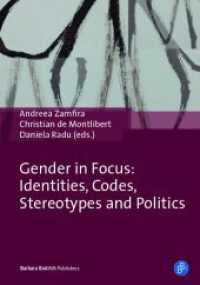- ホーム
- > 洋書
- > ドイツ書
- > Social Sciences, Jurisprudence & Economy
- > Politics, Society, Work
- > political science
Full Description
This book argues why Critical Theory - as first developed in the Zeitschrift für Sozialforschung - must be updated to help us tackling today's capitalist polycrisis, from economic via political to ecological crises. Yet, following the dissolution of the Institute for Social Research in New York, and the latest with the death of Adorno in 1969 and the death of Marcuse almost exactly ten years later, there has been a 'domestication' of the main strands of the Frankfurt School. To understand and overcome this domestication, the book traces, with the means of philosophy and sociology, its two affirmative steps in a liberal and in a postmodern turn. As an alternative to both, it defends Habermas' project of modernity, yet only by disentangling it - in Marxian fashion - from the capitalist process of modernisation. This disentanglement is at the same time a political radicalisation. It is necessary because the cultural-political ideal(s) of the project of modernity - from human autonomy via rational society to qualitative individuality - can only be realised beyond the framework of capitalism. As their conceptual concentrate, the book proposes political autonomy as a key concept confined neither by Kantian or liberal approaches nor by autonomist or operaist traditions. Rather, it draws on thinkers like Herbert Marcuse, Ellen Meiksins Wood, and Martin Hägglund to rephrase Marxist concepts such as social freedom, democratic socialism, and the end of prehistory. In this way, political autonomy is developed both as a legit criterion for justified critique and as the philosophical foundation and emancipatory goal of a pluralist yet transcapitalist Critical Marxist Theory.
Contents
Chapter 1: Introduction.- Part I: (De-)Domesticating Critical Theory: From Modernist Defeatism and the Liberal and Postmodern Turns to the Radicalising Project of Modernity.- Chapter 2: What is Critical (Marxist) Theory? Ideology-Critical Totality Analysis towards Emancipatory Praxis.- Chapter 3: Domesticating Critical Theory: Two Affirmative Turns after one Defeatist Dead End.- Chapter 4: The Liberal Turn of the Frankfurt School as its first Affirmative Turn.- Chapter 5: The Postmodern Turn in the Frankfurt School as its second Affirmative Turn.- Chapter 6: Beyond Modernist Defeatism, Liberalist Apology, and Postmodern Farewells: The Radicalising Project of Modernity.- Part II: Critical Marxist Theory and Political Autonomy. From the Need to May to the Revolution for Living.- Chapter 7: Which Criterion for which Critique? Towards the Prenormative Meta-Criterion of Political Autonomy as the Precondition of the Good Life.- Chapter 8: Mapping the Background of Political Autonomy: The Dialectics of Self (Voicing), Subject (Listening), and Human (Caring).- Chapter 9: Critical Marxist Theory of Political Autonomy: Social Freedom, Substantial Democratisation, the End of Prehistory, and the Revolution for Living.- Chapter 10: Conclusion: Critical Marxist Theory of Political Autonomy. Towards a Radical Politics of Maying and its Revolution for Living.








